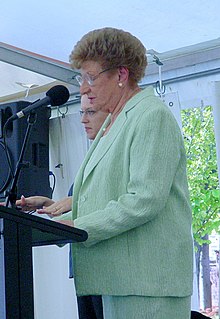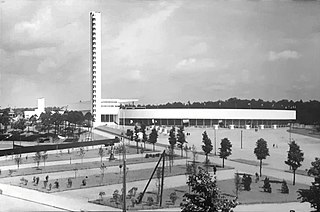
Francina "Fanny" Elsje Blankers-Koen was a Dutch track and field athlete, best known for winning four gold medals at the 1948 Summer Olympics in London. She competed there as a 30-year-old mother of two, earning her the nickname "the flying housewife", and was the most successful athlete at the event.

Marjorie Jackson-Nelson is a former Governor of South Australia and a former Australian athlete. She finished her sporting career with two Olympic and seven Commonwealth Games Gold Medals, six individual world records and every Australian State and National title she contested from 1950–1954.
The women's 100 metres hurdles at the 2004 Summer Olympics as part of the athletics program were held at the Athens Olympic Stadium from August 22 to 24.

The men's 400 metres hurdles at the 2008 Summer Olympics took place on 16–18 August at the Beijing National Stadium. There were 26 competitors from 19 nations. The event was won by Angelo Taylor of the United States, the nation's 18th victory in the men's 400 metres hurdles. Taylor was the seventh man to win multiple medals in the event, and third to win two golds. The United States completed its fifth podium sweep in the men's long hurdles, as Kerron Clement and Bershawn Jackson took silver and bronze.

The men's 110 metres hurdles at the 1980 Summer Olympics in Moscow, Soviet Union had an entry list of 23 competitors from 16 nations, with three qualifying heats and two semifinals (16) before the final (8) took place on Sunday 27 July 1980. The maximum number of athletes per nation had been set at 3 since the 1930 Olympic Congress. The event was won by Thomas Munkelt of East Germany, the first medal by a German runner in the event. Alejandro Casañas of Cuba took silver for the second Games in a row, making him the eighth man with two medals in the event. Aleksandr Puchkov's bronze was the Soviet Union's second medal in the event and first since 1964.

The men's 110 metre hurdles at the 2000 Summer Olympics as part of the athletics programme were held at Stadium Australia on Sunday 24 September and Monday 25 September 2000. Forty-four athletes from 31 nations competed. The maximum number of athletes per nation had been set at 3 since the 1930 Olympic Congress. The event was won by Anier Garcia of Cuba, the nation's first championship in the event and first medal in the event since 1980. Mark Crear's bronze made him the 10th man to win a second medal in the event.
The Women's 400 metre Hurdles at the 2000 Summer Olympics as part of the athletics programme were held at Stadium Australia on Sunday 24 September, Monday 25 September and Wednesday 27 September 2000.
The women's 200 metres sprint event at the 1948 Olympic Games took place on August 5 and August 6. The final was won by Dutch athlete Fanny Blankers-Koen. It was the first time this event was included in the Summer Olympics.

The men's 200 metres sprint event at the 1952 Olympic Games took place between July 22 and July 23. There were 71 competitors from 35 nations. The maximum number of athletes per nation had been set at 3 since the 1930 Olympic Congress. The final was won by American Andy Stanfield. Americans also took silver and bronze as the United States swept the medals in the event for the third time.
The men's 400 metres sprint event at the 1952 Olympic Games took place between July 24 and July 25. Seventy-one athletes from 35 nations competed. The maximum number of athletes per nation had been set at 3 since the 1930 Olympic Congress. The event was won by George Rhoden of Jamaica, the second consecutive title in the event by a Jamaican. Herb McKenley repeated his silver medal performance from 1948, becoming the second man to win two medals in the event.

The men's 400 metres hurdles event at the 1960 Olympic Games took place between August 31 and September 2. There were 34 competitors from 23 nations. The maximum number of athletes per nation had been set at 3 since the 1930 Olympic Congress. The event was won by Glenn Davis of the United States, the first man to successfully defend an Olympic title in the 400 metres hurdles. As of the 2016 Games, he remains the only man to do so; three others have won two gold medals in the event, but all three did so in nonconsecutive Games. It was the United States' fifth consecutive and 10th overall victory in the event. The Americans also completed their second consecutive medal sweep in the event, as Cliff Cushman took silver and Dick Howard took bronze.
The women's 80 metres hurdles event at the 1948 Summer Olympic Games took place on 3 and 4 August. The final was won by Dutch athlete Fanny Blankers-Koen.

The men's 110 metres hurdles event at the 1952 Summer Olympic Games took place July 23 and July 24. Thirty athletes from 20 nations competed. The maximum number of athletes per nation had been set at 3 since the 1930 Olympic Congress. The final was won by the American Harrison Dillard. Dillard's compatriots, Jack Davis and Arthur Barnard, took 2nd and 3rd place. It was the fourth of nine consecutive American victories, and the tenth overall gold medal for the United States in the 110 metres hurdles. It was also the second of four consecutive American podium sweeps, and the sixth overall sweep by the United States in the event.

The men's 400 metres hurdles event at the 1952 Summer Olympics took place July 20 and July 21 at the Helsinki Olympic Stadium. There were 40 competitors from 24 nations. The maximum number of athletes per nation had been set at 3 since the 1930 Olympic Congress. The final was won by American Charles Moore. It was the nation's third consecutive and eighth overall victory in the event. The Soviet Union, in its debut, and New Zealand each earned their first medal in the men's 400 metres hurdles, with Yuriy Lituyev's silver and John Holland's bronze, respectively.

The men's 400 metres hurdles competition at the 2012 Summer Olympics in London, United Kingdom took place on 3–6 August at the Olympic Stadium. There were 49 competitors from 33 nations. The event was won by Félix Sánchez of the Dominican Republic, the second victory in the men's long hurdles for both the man and the nation. Sánchez was the eighth man to win multiple medals in the event and fourth to win two golds. Michael Tinsley of the United States earned silver. Javier Culson's bronze was Puerto Rico's first medal in the event.

The men's 110 metres hurdles competition at the 2012 Summer Olympics in London, United Kingdom was held at the Olympic Stadium on 7–8 August. Fifty-three athletes from 33 nations competed. The event was won by Aries Merritt of the United States, the nation's first championship in the event since 1996 and 19th overall. Hansle Parchment's bronze was Jamaica's first medal in the men's high hurdles.
The women's 100 metres sprint event at the 1952 Olympic Games took place on July 21 and July 22. The final was won by Australian Marjorie Jackson, who equalled the world record set in 1936 by Helen Stephens.
The Women's 80 metres hurdles at the 1952 Summer Olympics took place on July 24 and July 25 at the Helsinki Olympic Stadium. Australian athlete Shirley Strickland de la Hunty earned the gold medal, setting new World and Olympic records.

The men's 110 metre hurdles at the 2004 Summer Olympics as part of the athletics program were held at the Athens Olympic Stadium from August 24 to 27. Forty-seven athletes from 34 nations competed. The event was won by Liu Xiang of China, the nation's first medal in the event. Terrence Trammell and Anier García became the 11th and 12th men to win multiple medals in the 110 metres hurdles.
The women's 400 metres hurdles at the 2017 World Championships in Athletics was held at the London Olympic Stadium on 7−8 and 10 August.












